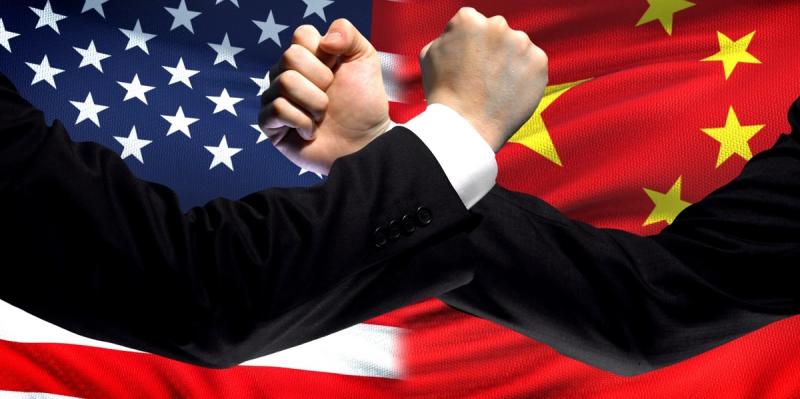The 'rivalry peril' with China: toxic cold war is where we are headed
By: Daniel Larison - Responsible Statecraft

The 'rivalry peril' with China: toxic cold war is where we are headed

In their new book, Jackson and Brenes say Washington must abandon the primacist mindset
There is a bipartisan hawkish China consensus in Washington that has formed over the last fifteen years. Members of both parties are quick to link their preferred policies to the cause of "competing" with the Chinese government, and there is a tremendous appetite among our political leaders for exaggerating both Chinese ambitions and capabilities.
China rivalry has become a new catch-all justification for higher military spending, nuclear modernization, increasing America's military presence in the Pacific, and establishing closer ties with China's neighbors.
To promote the rivalry with China, hawkish analysts have been spreading a convenient myth about the Cold War that ignores the serious costs to American society and to the many countries that were devastated by direct interventions and proxy wars. According to that triumphalist myth, the U.S. "won" the Cold War against the Soviets and in the process became stronger and more unified as a nation, and now it can do the same thing by pursuing rivalry with China.
In their new book, "The Rivalry Peril: How Great-Power Competition Threatens Peace and Weakens Democracy," Van Jackson and Michael Brenes debunk the triumphalist myths about the Cold War and remind us of just how destructive and deadly America's last experience with great power rivalry was. As they put it, "Great-power rivalries throughout history, and especially during the Cold War, have entailed mass brutality, sacrifice, and perils borne disproportionately by ordinary citizens rather than elites."
Jackson and Brenes directly challenge the emerging hawkish China consensus and spell out the steep costs and dangers of pursuing rivalry with China. They also counter irresponsible threat inflation and fearmongering about Chinese intentions. It is a crucial and valuable intervention in the debate over China policy and the direction of U.S. foreign policy more broadly that Americans of all political stripes would benefit from reading.
China hawks would have us believe that the U.S. should engage in a costly global struggle against a major adversary and that this will also somehow bring out the best in our country and heal existing political divisions. As the authors tell us, "The idea that competition brings out the best in a nation is romantic, but wrong. American politics has become even more divisive and caustic in the age of China rivalry. China features as an object fueling that polarization, not ameliorating it."
The hawks' myth also minimizes or erases the abuses and destruction caused by Cold War policies, and it presents a militarized contest that very nearly destroyed the world as something to be emulated and repeated.
As the full record of the history of Cold War shows, however, prolonged intense rivalry with another great power exacerbates internal political divisions, fuels toxic prejudices, and leads to trampling on the rights of minorities and dissenters. Rivalry doesn't deliver the political goods that its supporters promise, and it threatens to wreck what remains of our democratic system. In addition, it also makes a catastrophic war between the U.S. and China much more likely.
The authors also explain how rivalry between the U.S. and China contributes to the concentration of wealth and the worsening of economic inequality in both countries. Rivalry feeds the consolidation of oligarchy on both sides of the Pacific, and increasing military spending diverts and wastes resources that would otherwise be put to more productive and peaceful uses. A relative few at the top benefit from a militarized rivalry between our countries while most people in the U.S. and China are consistently shortchanged. As Jackson and Brenes put it, "Not only does rivalry empower the already powerful; it further marginalizes the powerless."
Great power rivalry inevitably stokes nationalism in both China and the U.S. Nationalists on either side use fear of the adversary to whip up support for a confrontational foreign policy and to stifle dissent. The rivalry also encourages both governments to assume the worst about the other's intentions and to be reluctant to engage in anything beyond the most basic diplomatic exchanges.
If one of the key foundations of the Asian peace for the last four decades has been Sino-U.S. detente, as Jackson correctly argued in his previous book "Pacific Power Paradox," the breakdown of that detente and the ensuing deep mistrust between our governments have brought our countries and the wider region much closer to disastrous conflict than we have been in generations.
This is exactly the time when we need both governments to repudiate rivalry as a framework for their policies rather than embrace it.
Jackson and Brenes do an excellent job of dismantling the case for rivalry, but they also offer a compelling alternative that restrainers should find appealing. One part of the solution is to abandon the pursuit of primacy. As Jackson and Brenes make clear, it is Washington's pursuit of primacy that is wildly at odds with the political and economic realities in Asia and the Pacific, and it is the pursuit of primacy that is destabilizing.
To correct course, the "United States must relinquish its ambitions for primacy and work toward a stable equilibrium with China and other regional actors." They recommend that the U.S. embrace military restraint paired with what they call a security dilemma sensibility. That sensibility is "the ability to understand the role that fear might play in their attitudes and behavior, including, crucially, the role that one's own actions may play in provoking that fear."
In short, U.S. policymakers need to consider how Chinese leaders perceive U.S. actions and try to understand how U.S. policies lead to Chinese responses to them.
U.S.-China rivalry has largely been accepted in Washington as the appropriate framing for U.S. policies in Asia and beyond. That has put U.S. foreign policy on a perilous path to a new cold war. The U.S. is not doomed to go down this path. There is still time for the U.S. to go in a better, more peaceful direction, but that requires recognizing how ruinous great power rivalry truly is and realizing that the U.S. needs a different strategy.
"The Rivalry Peril" is an important contribution in imagining what the strategy might look like.
The Code of Conduct and Terms of Service must be complied with.
Any comment posted about politics or religion not relevant to the seeds/articles that are posted will be deleted.
The administrator reserves the right to delete any comment he considers to be offensive, off topic or of no value.
Videos or images or links to sources that the Administrator cannot open must be described or explained when requested or they will be deleted.






There are some members of NT who really need to read this book. For a long time now I have been saying that although Xi Jinping has been using the word "co-operation" for a win-win situation that will not only benefit both nations but the world at large, what he gets back is the word "competition", said by those who REALLY mean "confrontation" because that's what they walk rather than what they talk.
I wonder how many people on social media sites would be interested in actually reading an entire book?
Do a poll.
I wonder-- of those who reply, how many would be truthful?
Since nobody, not even the RA, will know who they are there is no reason for them not to be truthful.
Personally, I think the USA should stop all trade with China.
Can you predict what the result of that would be for Americans?
What a load of garbage.
China’s ambitions are readily apparent in their rapid military build up. They aren’t doing that in the interest of international cooperation and detente.
When China sails its navy into the "Gulf of America", the Bering Sea and San Francisco Bay and builds bases in Cuba and Mexico and the far eastern tip of Russia the way America has been doing to and around China, maybe Americans should be worried about it. The sentiment in your comment is proof of what the authors have written.
That doesn’t even begin to address my comment. The undeniable and massive build up of their military.
What sovereign nations is China defending from the USA?
[✘]
China's seems too busy harassing its own neighbors and violating their sovereignty, helping Russia terrorize Ukraine, cutting internet cables in Baltic and serving as a payday loan type extortion lender to third world countries to bother sailing into the Gulf right now. Committing massive amounts of IP theft seems to be something they can do without employing their navy.
Yes, that’s it.
My comment was based on the military provocations that America has been doing such as sailing through the Taiwan Straits, holding military drills with China's neighbours. If China is building its military it is to be able to defend China from invasion by the strongest military in the world, not to invade other nations.
As far as I know, it is only concerned with defending itself, as I just said.
If China is doing so many things to harm the rest of the world, why hasn't it been blasted off the face of the Earth by the world's police nation? So tempted to do a whataboutism, but then, everybody knows so why bother.